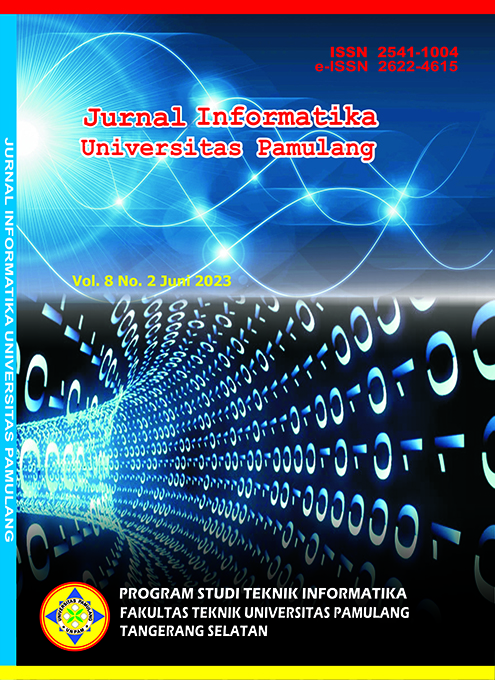Decision Support System for Optimizing Rastra Distribution Routes Using Genetic Algorithm
DOI:
https://doi.org/10.32493/informatika.v8i2.33353Keywords:
Decision Support System, Genetic Algorithm, Rastra Distribution, MDSDVRPAbstract
Vehicle Routing Problem (VRP) is an optimal route design from a group of vehicles that deliver goods to a set of customers with a certain demand. VRP was widely studied as part of solving the distribution efficiency which minimizes the cost of traveled vehicle. Bulog Subdivre South Surabaya distribute Rastra to every village which has constraint of Multi depot and Split delivery (MDSDVRP). This study aims to minimize the traveled distance of MDSDVRP (Rastra distribution) using Genetic Algorithm (GA) and to find out the efficiency of the route solution. The research covers the steps to solve MDSDVRP using GA to generate feasible and efficient solution route. Then development of a Decision Support System (DSS) that applies the algorithm is implemented on web platform and the result of route solution is presented on the mobile platform. The system testing is carried out to test the user satisfaction (83.8%) which found that overall users were considered very agree, good, like for each component of user satisfaction. The traveled distance is compared between GA route and routes of the original data from 2013-2017. The efficiency of GA was evaluated and found that the traveled distance from the previous route is reduced by 3.7% (444 km) and in 2017 is reduced the distance traveled by 9.5 % (1,093 km). The GA can generate a better solution and optimize the distance than the original route.
References
Archetti, C., Speranza, M. G., & Savelsbergh, M. W. P. (2008). An optimization-based heuristic for the split delivery vehicle routing problem. Transportation Science, 42(1), 22–31. https://doi.org/10.1287/trsc.1070.0204
Dantzig, G. B., & Ramser, J. H. (1959). The Truck Dispatching Problem. Management Science, 6(1), 80–91. https://doi.org/10.1287/mnsc.6.1.80
Doll, W. J., & Torkzadeh, G. (1988). The measurement of end-user computing satisfaction. MIS Quarterly: Management Information Systems, 12(2), 259–273. https://doi.org/10.2307/248851
Ge, Y. (1997). Genetic Algorithms and Engineering Design (Book Review). International Journal of Human-Computer Interaction, 9(4), 457–458. https://doi.org/10.1207/s15327590ijhc0904_9
Giosa, I. D., Tansini, I. L., & Viera, I. O. (2002). New assignment algorithms for the multi-depot vehicle routing problem. Journal of the Operational Research Society, 53(9), 977–984. https://doi.org/10.1057/palgrave.jors.2601426
Gulczynski, D., Golden, B., & Wasil, E. (2010). The split delivery vehicle routing problem with minimum delivery amounts. Transportation Research Part E: Logistics and Transportation Review, 46(5), 612–626. https://doi.org/10.1016/j.tre.2009.12.007
Gulczynski, D., Golden, B., & Wasil, E. (2011). The multi-depot split delivery vehicle routing problem: An integer programming-based heuristic, new test problems, and computational results. Computers and Industrial Engineering, 61(3), 794–804. https://doi.org/10.1016/j.cie.2011.05.012
Karakatic, S., & Podgorelec, V. (2015). A survey of genetic algorithms for solving multi depot vehicle routing problem. Applied Soft Computing Journal, 27, 519–532. https://doi.org/10.1016/j.asoc.2014.11.005
Lei, J. J., & Li, J. (2009). A decision support system for supply chain management based on PSO and GIS. Proceedings - 2009 IITA International Conference on Control, Automation and Systems Engineering, CASE 2009, 58–61. https://doi.org/10.1109/CASE.2009.55
Ombuki-berman, B., & Hanshar, F. T. (2009). Using Genetic Algorithms for Multi-depot Vehicle Routing. 77–99.
Ray, S., Soeanu, A., Berger, J., & Debbabi, M. (2014). The multi-depot split-delivery vehicle routing problem: Model and solution algorithm. Knowledge-Based Systems, 71(August), 238–265. https://doi.org/10.1016/j.knosys.2014.08.006
Surekha, P. (2011). Solution To Multi-Depot Vehicle Routing Problem Using Genetic Algorithms. August, 118–131.
Wallace, A. (2012). Newspaper Distribution as Vehicle Routing Problem.
Downloads
Published
Issue
Section
License
Authors who publish with this journal agree to the following terms:
- Authors retain copyright and grant the journal right of first publication with the work simultaneously licensed under a Creative Commons Attribution-NonCommercial 4.0 International (CC BY-NC 4.0) that allows others to share the work with an acknowledgement of the work's authorship and initial publication in this journal.
- Authors are able to enter into separate, additional contractual arrangements for the non-exclusive distribution of the journal's published version of the work (e.g., post it to an institutional repository or publish it in a book), with an acknowledgement of its initial publication in this journal.
- Authors are permitted and encouraged to post their work online (e.g., in institutional repositories or on their website) prior to and during the submission process, as it can lead to productive exchanges, as well as earlier and greater citation of published work (See The Effect of Open Access).
Jurnal Informatika Universitas Pamulang have CC-BY-NC or an equivalent license as the optimal license for the publication, distribution, use, and reuse of scholarly work.
In developing strategy and setting priorities, Jurnal Informatika Universitas Pamulang recognize that free access is better than priced access, libre access is better than free access, and libre under CC-BY-NC or the equivalent is better than libre under more restrictive open licenses. We should achieve what we can when we can. We should not delay achieving free in order to achieve libre, and we should not stop with free when we can achieve libre.
Jurnal Informatika Universitas Pamulang is licensed under a Creative Commons Attribution-NonCommercial 4.0 International (CC BY-NC 4.0)
YOU ARE FREE TO:
- Share : copy and redistribute the material in any medium or format
- Adapt : remix, transform, and build upon the material for any purpose, even commercially.
- The licensor cannot revoke these freedoms as long as you follow the license terms





